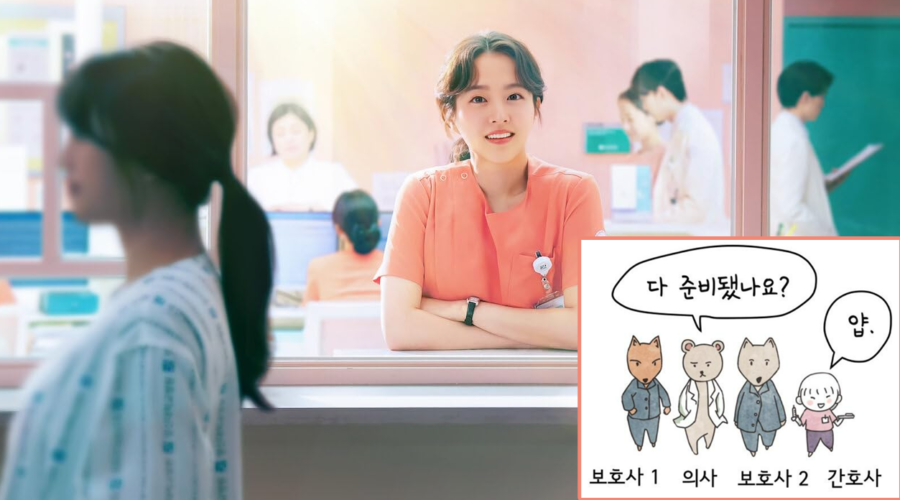In the recent past, we have seen a handful of stories about mental health such as Spinning Out, Ginny & Georgia, Degrassi: The Next Generation, Sex Education, BoJack Horseman, Euphoria, and Normal People, among others. Of course, the entertainment industry still has a long way to go when it comes to fostering realistic and relatable portrayals of mental health. But, fortunately, many of these shows have managed to confront outdated and inaccurate representations.
Amid this sea of productions, Netflix premiered the South Korean drama Daily Dose of Sunshine, an adaptation of the webcomic of the same name by author Lee Ra-Ha. This digital comic, in turn, chronicles Ra-Ha’s real-life experiences as a nurse, and promotes an honest and empathetic conversation about mental health.
Netflix’s Daily Dose of Sunshine
Directed by Lee Jae-Kyu and Kim Nam-Soo, and written by Lee Nam-Kyu, Oh Bo-Hyun and Kim Da-Hee, Daily Dose of Sunshine is a healing and educational k-drama that explores mental illness with empathy, tact and humor. The show’s creators have described Daily Dose of Sunshine as a warm story for today’s adults.
The Netflix hospital drama features a star-studded cast including Park Bo-young, Yeon Woo-jin, Jang Dong-yoon and Lee Jung-eun in the lead roles.
The story is set in a psychiatric ward and depicts a wide range of mental health conditions and the treatments that follow. Specifically, the fiction revolves around the young and noble nurse Jung Da-eun (Park Bo-young), who has just been transferred from the Internal Medicine department to the Psychiatry department. In that medical environment, we see a bit of the usual: doctors and nurses doing their best to help their patients.
Daily Dose of Sunshine follows Jung Da-eun’s growth as a person and as a professional, while she learns the ins and outs of the Psychiatric Unit at Myung Shin University Hospital. The young protagonist is a kind soul who always tries to go the extra mile for the welfare of others. Chaos ensues, however, when Jung Da-eun herself ends up in a psychiatric ward, seriously ill.
Our heroine’s powerful story arc underscores the premise of the series: mental ill-health can affect anyone, at any time.
Over the course of 12 episodes of about 70 minutes, Jung Da-eun faces various challenging circumstances that test her tenacity as a nurse and her sensitivity as a human being. Overall, the series offers us an opportunity to learn more about the world of psychiatry, and reflects the perspectives of specialists, nurses, patients, family members and loved ones.
Like many medical dramas, Daily Dose of Sunshine has an episodic structure. Each chapter deals with a specific patient and follows them through the Psychiatric Unit until their case is closed. Depression, schizophrenia, self-harm, bipolar disorder, gaslighting and social phobia, panic disorder, delusions, pseudodementia, and even suicide are some of the themes explored in the fiction.
Daily Dose of Sunshine strives for an honest, positive and thoughtful portrayal of psychiatric patients
The script, written by Lee Nam-Kyu, Oh Bo-Hyun and Kim Da-Hee treats these delicate clinical disorders with care and sensitivity. The creators demonstrate a respectful understanding of the issues they are dealing with. Notably, the use of humor does not mask the seriousness of the situations portrayed, but rather serves as an emotional relief at the climactic or heartbreaking moments.
In a television landscape that often misunderstands and misrepresents mental illness, Daily Dose of Sunshine strives for an honest, positive and thoughtful portrayal of psychiatric patients.
Important revelations stay with you after viewing, including that people struggling with mental illness are just like anyone else; seeking professional help is a sign of strength, not weakness; most mental illnesses do not get better on their own and, if left untreated, often worsen over time and cause serious problems.
Just like in Grey’s Anatomy and various shows of this cut, the doctors of Myung Shin University Hospital have romances with their colleagues. In this regard, Da-eun finds herself in a love triangle with colorectal surgeon Dong Go-yoon (Yeon Woo-jin), and her long-time friend Song Yoo-chan (Jang Dong-yoon).
The love entanglement that unfolds in Daily Dose of Sunshine is fun and engaging, but make no mistake: the romance is destined to take a backseat to the series’ raison d’être. It’s clear that the priority of the show’s creators is to make visible the lives of psychiatric patients and their caregivers.
Throughout, the drama makes it clear that nurses are key contributors and vital members of multi-disciplinary healthcare teams. It becomes more than evident that nursing is a physically and emotionally draining job, requiring critical thinking and resilience.
As for the aesthetic aspects, the screenwriters and filmmakers do their best to take us into the inner worlds of the patients. It is through the visual effects and metaphorical imagery that we can easily put ourselves in the shoes of the people being treated and understand their mental states and emotions. There are several sensitive or emotionally triggering scenes that are incredibly true to the experience of mental health.
Our Verdict
Daily Dose of Sunshine is a sobering, well-executed and emotionally charged program. It has important messages about mental health and the power of human connection.
“We are all on the border between normal and abnormal,” comments Jung Da-eun at the end of Daily Dose of Sunshine. And with that statement, the devoted nurse reminds us that mental illness does not discriminate.
The show urges us to take care of ourselves – both physically and mentally – to practice self-compassion, to appreciate human connections, to seek help when needed, and above all to remain hopeful during difficult times. Daily Dose of Sunshine leaves us with the feeling that together we can create a more empathetic, caring world.
Images: Morning Comes To The Mental Ward Webtoon and Yang Hae Sung / Netflix

